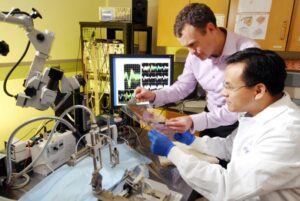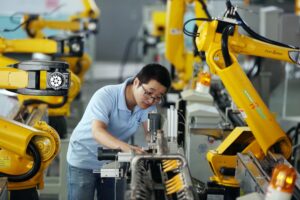Top 20 Chemical Engineer Fresher Interview Questions
Table of Contents
Top 20 Chemical Engineer Fresher Interview Questions
1. Can you explain the role of a chemical engineer in the industry?
Example – “Chemical engineers play a vital role in designing, developing, and optimizing processes for the production of chemicals and related products. They also focus on environmental and safety aspects, ensuring efficient and sustainable operations.”
2. What are some common unit operations in chemical engineering?
Example – “Unit operations include processes like distillation, filtration, heat exchange, crystallization, and mixing, which are fundamental in chemical engineering for separating, transforming, or combining substances.”
3. How do you ensure safety in chemical processes?
Example – “Safety is a top priority. We employ safety protocols, conduct hazard assessments, use proper equipment, and implement process controls to prevent accidents and minimize risks to personnel and the environment.”
4. Can you explain the concept of mass and energy balances?
Example – “Mass balances ensure that the amount of material entering a process equals the amount leaving, while energy balances account for energy inputs and outputs to maintain system stability and efficiency.”
5. What are the key differences between a batch and continuous process?
Example – “Batch processes are used for small-scale or specialty production, while continuous processes are employed for large-scale, consistent production. Batch processes involve discrete steps, while continuous processes run uninterrupted.”
6. How do you handle chemical waste disposal and environmental regulations?
Example – “We follow strict waste management procedures, including recycling, treatment, and disposal in compliance with environmental regulations to minimize the environmental impact.”
7. Explain the importance of process optimization in chemical engineering?
Example – “Process optimization aims to improve efficiency, reduce costs, and enhance product quality. It involves adjusting variables like temperature, pressure, and flow rates to achieve optimal results.”
8. What software tools are commonly used in chemical engineering, and do you have experience with any of them?
Example – “Software like Aspen HYSYS, MATLAB, and AutoCAD are often used for simulations, modeling, and process design. I have experience with [mention software you’ve used], which I used for [mention relevant project].”
9. Describe a challenging project you’ve worked on during your studies and how you overcame it?
Example – “During my studies, I worked on a project involving the design of a wastewater treatment system. The challenge was to meet strict environmental regulations while minimizing costs. I overcame this by optimizing the process, implementing advanced treatment techniques, and using cost-effective materials.”
10. How do you stay updated with the latest developments in chemical engineering?
Example – “I stay updated through industry journals, attending conferences, and being part of professional organizations like AIChE (American Institute of Chemical Engineers). Online courses and webinars are also valuable resources.”
11. Can you explain the significance of P&ID (Piping and Instrumentation Diagrams) in chemical engineering?
Example – “P&IDs are essential for visualizing and documenting the process flow, equipment, and control systems. They help engineers understand the process, identify potential issues, and ensure safe and efficient operation.”
12. How do you troubleshoot a sudden drop in product yield in a manufacturing process?
Example – “I would start by examining process data, checking equipment for malfunction, and reviewing operating procedures. Then, I would conduct experiments and simulations to pinpoint the root cause and implement corrective actions.”
13. What safety precautions should be taken when working with hazardous chemicals?
Example – “Safety precautions include wearing appropriate personal protective equipment (PPE), working in well-ventilated areas, following handling instructions, and having emergency response plans in place.”
14. How do you handle a situation where there’s a conflict between production goals and environmental regulations?
Example – “I would prioritize environmental compliance and explore ways to optimize the process without compromising safety or the environment. It’s essential to find a balance between production and sustainability.”
15. What is your understanding of the term “process control”?
Example – ” Process control involves monitoring and adjusting process variables to maintain desired conditions, such as temperature, pressure, and flow rate, to ensure consistent product quality and efficiency.”
16. Can you discuss a time when you had to work in a team to solve a complex problem?
Example – “In a group project on reactor design, we faced challenges in selecting the appropriate catalyst. Through collaboration, we researched options, conducted experiments, and analyzed data to make an informed decision that led to project success.”
17. How do you ensure quality control in chemical processes?
Example – “Quality control involves rigorous testing and inspection of raw materials, intermediate products, and final products to ensure they meet predefined specifications. Statistical tools like Six Sigma can be used for quality improvement.”
18. Explain the concept of heat exchangers and their applications?
Example – “Heat exchangers transfer heat between two fluids at different temperatures without mixing them. They are used in various applications, such as heating, cooling, and energy recovery in industries like petrochemicals and HVAC systems.”
19. What do you consider the most significant challenges facing the chemical industry today?
Example – “Some challenges include sustainability, environmental regulations, and the need for innovative processes to reduce waste and energy consumption while producing high-value products.”
20. Where do you see yourself in your chemical engineering career in the next five years?
Example – “In the next five years, I envision myself as a well-rounded chemical engineer, gaining expertise in process optimization and sustainability. I aim to contribute to innovative solutions that address industry challenges and continue my professional development.”




